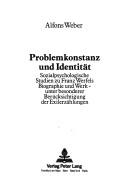| Listing 1 - 3 of 3 |
Sort by
|

ISBN: 3820486852 Year: 1987 Publisher: Frankfurt am Main Lang
Abstract | Keywords | Export | Availability | Bookmark
 Loading...
Loading...Choose an application
- Reference Manager
- EndNote
- RefWorks (Direct export to RefWorks)
Authors, Exiled, in literature --- Authors in literature --- Exiles in literature --- Exiles' writings, German --- German fiction --- 830 <100> --- 830 <100> Exilliteratur --- Exilliteratur --- German literature --- History and criticism --- Thematology --- anno 1900-1999
Book
ISBN: 3825314294 Year: 2003 Volume: *23 Publisher: Heidelberg Winter
Abstract | Keywords | Export | Availability | Bookmark
 Loading...
Loading...Choose an application
- Reference Manager
- EndNote
- RefWorks (Direct export to RefWorks)
Authors [Exiled ] in literature --- Bannelingen in de literatuur --- Ecrivains exilés dans la littérature --- Exiles in literature --- Exilés dans la littérature --- Schrijvers in ballingschap in de literatuur --- Authors, Exiled, in literature --- Epistolary poetry, Latin --- -Exiles in literature --- Poets, Latin --- -Latin poets --- Latin epistolary poetry --- Latin poetry --- History and criticism --- Homes and haunts --- -Constanta (Romania) --- -In literature --- Authors, Exiled, in literature. --- Exile (Punishment) in literature. --- Exiles in literature. --- History and criticism. --- -History and criticism --- Exile (Punishment) in literature --- Latin poets --- Ovid, --- Constanța (Romania) --- Tomes (Romania) --- Constantza (Romania) --- Kustenji (Romania) --- Kustendjie (Romania) --- Constanța, Romania (City) --- Tomis (Romania) --- Tomi (Romania) --- Κωνστάντζα (Romania) --- Kōnstantza (Romania) --- Κωνστάντια (Romania) --- Kōnstantia (Romania) --- Кюстенджа (Romania) --- Ki︠o︡stendzha (Romania) --- Констанца (Romania) --- Konstant︠s︡a (Romania) --- Köstence (Romania) --- In literature. --- Ovid --- Poets [Latin ] --- Romania --- Constanta (Romania) --- Epistolary poetry [Latin ] --- In literature
Book
ISBN: 9781786732606 1786732602 9781786722607 1786722607 9781786722607 1784536873 9781784536879 1350986194 Year: 2017 Publisher: London : Bloomsbury Publishing,
Abstract | Keywords | Export | Availability | Bookmark
 Loading...
Loading...Choose an application
- Reference Manager
- EndNote
- RefWorks (Direct export to RefWorks)
"Edward Said was an exiled individual - the 'out of place' Palestinian in the USA. He saw the consequences of the 1948 dismantling of Palestine and the establishment of Israel through his parents' experiences and through the collective statelessness imposed on the Palestinians. His own personal experience of exile intensified when he moved to the USA. Yet despite the significance of exile to Said's life and work, no scholarship has yet focused on this theme in his writings or traced its ongoing applicability and importance. Rehnuma Sazzad fulfils this pressing need in literary and cultural research by providing the first comprehensive definition of Said's theory of exile and revealing its legacy in relation to five Middle Eastern intellectuals: Naguib Mahfouz, Mahmoud Darwish, Leila Ahmed, Nawal El Saadawi and Youssef Chahine. Sazzad argues that for Said, the ideal intellectual is a metaphorical exile. This exile does not have to be spatially disconnected from a homeland, but must demonstrate a willing homelessness through specific strategies and techniques. By selecting a novelist, poet, feminist, filmmaker and essayist, Sazzad shows how intellectuals from diverse fields become part of the Saidian discourse through the expression of these 'exilic' qualities. The book creates a portrait of redoubtable intellectual practice and in the twenty-first century context, when the frontiers of belonging are constantly redrawn, Edward Said's Concept of Exile adds new depths to discourses of resistance, home and identity."--Bloomsbury Publishing.
Said, Edward W., --- Criticism and interpretation. --- Authors, Exiled, in literature. --- Exiles in literature. --- Said, Edward W. --- Aiḍvarḍ Saʻīd --- Saʻīd, Aiḍvarḍ --- Saʻīd, Idwārd W. --- Saidŭ --- Sayide, Aidehua --- סעיד, אדוארד --- سعيد، إدوارد --- سعيد، إدوارد و. --- سعيد، ادورد --- 薩依德艾德華 --- Said, Edward Wadie --- Said, Eduardo
| Listing 1 - 3 of 3 |
Sort by
|

 Search
Search Feedback
Feedback About UniCat
About UniCat  Help
Help News
News